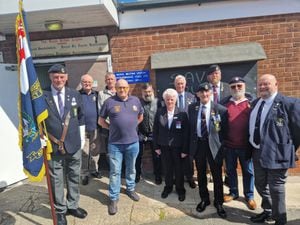Kevin Nunes murder: The case that can never be closed
They were dubbed the Night Express Gang. The method of transport was the railway. The drug of choice was cocaine.
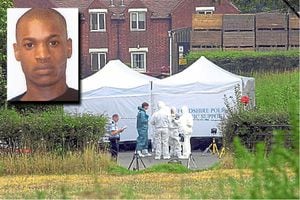
The destination: Aberdeen – the oil rich Scottish city where prices fetched up to 10 times more than on the drug-saturated streets of the Black Country.
Known as the 'Aberdeen Run', the enterprise was lucrative.
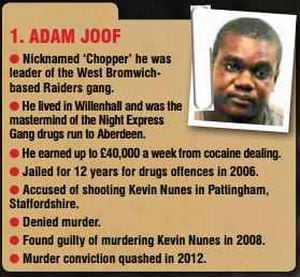
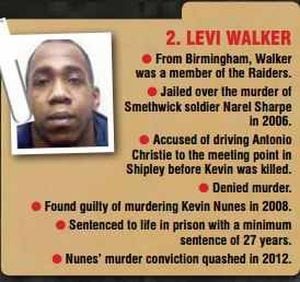
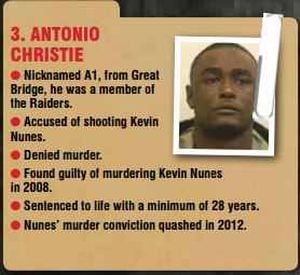
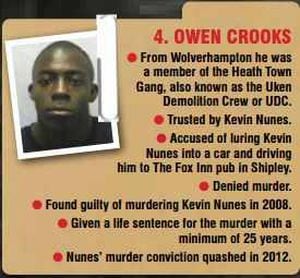
At the turn of the Millennium, Adam Joof was pocketing up to £40,000 a week.
He was known as Chopper.
In crime circles he was Premier League.
The drug Godfather figure from Willenhall was the leader of the West Bromwich-based Raiders gang. He headed the major crime syndicate and trafficked huge quantities of crack cocaine north of the border. Prostitutes would be used as mules to transport the precious cargo.
Joof ruled with an iron first. He always carried a gun.
He was ruthless.
Kevin Nunes' story begins in Jamaica, where he was born in December, 1981. The eldest of five brothers and sisters, he moved to London in 1998. A promising footballer, he had been on the books of Spurs.
He moved to the Whitmore Reans area of Wolverhampton around 2001 and started training with Stafford Rangers.
He had a new girlfriend who was carrying his unborn son. Kevin, aged 20, was believed to have strayed into the Aberdeen Run. He was said to have trusted few people.
September 19, 2002, was a dreary night. The last of the autumnal sunlight had set nearly three hours previous.
The rural lanes of South Staffordshire were shrouded in darkness.
At around 9.45pm farm hand David Sampson was returning home from a church meeting in Pattingham.
He drove down Clive Road when he spotted a body in the farm drive. He called the police and his boss John Roberts.
The man was later identified as Kevin Nunes.
He had five gunshot wounds in his back and appeared to be pistol-whipped. A murder inquiry was launched by Staffordshire Police.
The effort was huge.Around 180 officers made inquiries as far afield as Jamaica. A total of 1,060 statements were taken and more than 200 pieces of information were received from the public after appeals in the Express & Star.
But after nearly three years, officers hit a wall of silence.
They released a statement that possible drugs links were believed to be behind the reluctance of people to come forward with vital details. A reward of £25,000 was offered.
All had gone quiet.
That was until early 2005 and a cell confession led police to contact Simeon Taylor who gave a statement. Not only did he claim to know who had murdered Kevin, he said he was present when he had been handed over to his murderers, drove them to the site of the killing, and witnessed him being shot. He was taken into the witness protection scheme overseen by the Sensitive Policing Unit (SPU). Detectives now actively built a case.
Taylor's evidence would be critical.
The case would succeed or fail on his testimony. Getting him into the courtroom became the goal.
One by one, five men were arrested and charged by Staffordshire Police over Kevin's murder. They were Adam Joof, and fellow members of the Raiders gang Antonio Christie, from Great Bridge and Levi Walker, from Birmingham, as well as Michael Osbourne and Owen Crooks, both from Wolverhampton, who were members of the Heath Town Gang, also known as the Uken Demolition Crew (UDC).
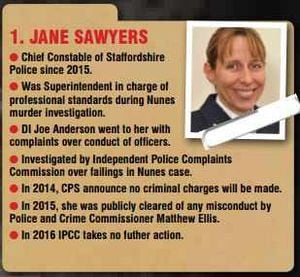
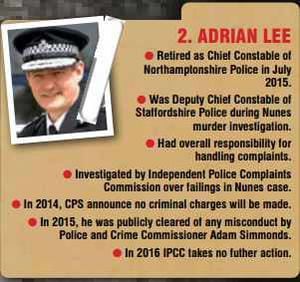
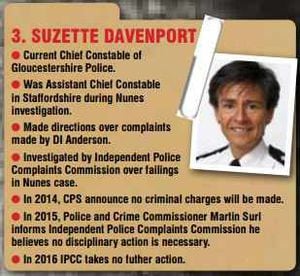
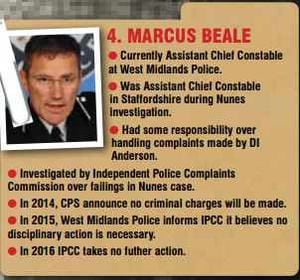
The prosecution's case was that on the day of the murder Joof and Christie had been released from custody. They had faced allegations of kidnap and rape. But the allegations had been dropped after a campaign of intimidation.
Crooks and Osbourne, the prosecution claimed, had been recruited by Joof to lure Kevin into a car.
The pair were two people Kevin trusted.
He was driven to the Fox Inn in Shipley where he was said to have been handed over to Joof, Christie, and Walker, who had been driven to the scene by Taylor.
Here it was alleged Kevin was taken at gunpoint by Joof and Christie who took him to a remote spot and shot him repeatedly with two firearms.
At Leicester Crown Court all five denied murder.
But on January 11, 2008, they were convicted by a jury and later sentenced to a combined 135 years.
After nearly six years, Staffordshire Police had jailed Kevin's killers – or so they thought.
Behind the scenes trouble had been brewing for some time. Taylor had been a handful for his minders in the covert Sensitive Policing Unit. He repeatedly made demands and frequently got himself into trouble.
Six months into Taylor being in witness protection, Detective Inspector Joe Anderson had been placed into the unit. It was not long until he found himself at odds with some of his colleagues as he cast a scrutinising eye over the unit and tried to modernise procedures.
Taylor then made a complaint against DI Anderson on grounds of racial discrimination. But an investigation was placed on hold – fearing it could impact on the impending court case police had worked to build and centred on Taylor's evidence.
Concerned with some of the practices DI Anderson went to then-Superintendent Jane Sawyers, head of professional standards, with a series of complaints.
He reported that there was 'corruption, dishonesty, and falsification' within the unit.
He said there was an unwritten understanding that Taylor would be retained on the witness protection scheme and give his evidence 'at any cost'.
As revealed by the Express & Star this week, officers went drinking and to nightclubs with the witness. Crimes also committed by Taylor while on the scheme were covered up and Taylor, along with his family, were sent on taxpayer paid-for holidays to South Africa.
And one of his handlers, DC Nigel Sargeant, had an affair with a female officer also working on the case and would meet at Taylor's safe house.
Evidence contamination was possible.
A lesser 'management review' was held into some of DI Anderson's complaints rather than a full blown investigation. That led to a report that became known as the Costello Report being completed by Superintendent Joe Costello and Chief Inspector Juliet Prince.
It was 73 pages long and completed in February 2007, many months before the start of the trial.
The report admitted: "The review team have investigated the issues raised by DI Anderson, however they could not deal with each issue in isolation as many of them are inter-related and symptomatic of deficiencies within the structure, operating practices and management regime within the Sensitive Policing Unit."
One of the issues raised by DI Anderson was a theft committed by Taylor.
He had dishonestly obtained a refund of £320 for a hotel paid for him by the police. The report examined the evidence which showed that there was good reason to believe that the officers concerned had deliberately not recorded the incident in the appropriate document with the intention of it being prevented from being disclosed to the defence.
Addressing the drinking of alcohol with Taylor, the report said: "A defence lawyer may also think it inappropriate and it could lead to undue inference being made as to the integrity and closeness of the relationship of the witness with the police."
But still this information was never disclosed to the defence lawyers or the judge.
Had it been, it would have cast serious concerns over the credibility of Taylor and the investigation.
Likewise, it would have alerted the defence to the fact DI Anderson was in a position to answer questions about his concerns in court.
It is speculated in court papers that senior officers may have been concerned about what DI Anderson would say.
After the murder convictions, Taylor was quickly dumped by Staffordshire Police from the witness protection scheme.
That would turn out to be a big mistake.
He told an associate that he had lied in court. The comments were recorded and passed to the defence teams who launched an appeal. The Criminal Cases Review Commission started looking into the case.
DI Anderson, who was not at all happy with how the police investigation and his complaints had been dealt with, found out about the review. Dubious over how the force would co-operate with the inquiry, he turned whistle-blower and started to 'smuggle' documents to the commission.
So concerned at what had been unearthed, the commission referred the case to Derbyshire Chief Constable Mick Creedon and a criminal investigation was launched.
On March 8, 2012, in the High Court Lord Justice Hooper quashed the murder convictions of Joof, Christie, Osbourne, Walker, and Crooks. Walker remained in jail, serving life for the murder of Smethwick trooper Narel Sharpe.
Joof returned to prison after being convicted of running a drugs racket in 2006.
Lord Hooper said: "This is a very bad case of non-disclosure. It is to be hoped that the appropriate measures will be taken against those responsible for what appears to us to be a serious perversion of the course of justice, if those measures have not already been taken. It is to be hoped that lessons will be learnt from this shocking episode."
Operation Kalmia was managed by the Independent Police Complaints Commission.
Fourteen police officers involved in the case were notified they were under investigation. The list included four of the most senior officers in the country: Staffordshire Chief Constable Jane Sawyers, ex-Northamptonshire Chief Constable Adrian Lee, Gloucestershire Chief Constable Suzette Davenport, and West Midlands Police Assistant Chief Constable Marcus Beale.
In 2014 they and 10 others were told they would not face any criminal charges.
And this year the IPCC announced, following consultation with Police and Crime Commissioners, none of the four most senior officers would face any disciplinary action, even though Mr Creedon's investigation recommended they should.
By this time 11 of the 14 officers had retired from the police, meaning no action could have taken place regardless of the watchdog's verdict.
Two years after the IPCC completed its investigations, it is yet to reveal its concluding report.
Its findings of what went so disastrously wrong – and who is responsible – in this case officially remains unknown.
It is the case that will never close.

